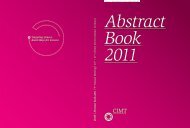Abstract Book 2010 - CIMT Annual Meeting
Abstract Book 2010 - CIMT Annual Meeting
Abstract Book 2010 - CIMT Annual Meeting
Create successful ePaper yourself
Turn your PDF publications into a flip-book with our unique Google optimized e-Paper software.
014 Abbas | Therapeutic vaccination<br />
Vaccine development through antigen targeting to mannose<br />
receptor<br />
Zaigham Abbas 1 , Richard Pleass 2 , Giuseppe Mantovani 3 , Lindy Durrant 1 and Luisa Martinez-Pomares 1<br />
1 School of Molecular Medical Sciences, University of Nottingham<br />
2 School of Biology, University of Nottingham<br />
3 School of Pharmacy, University of Nottingham<br />
50<br />
Dendritic cells (DC) are unique antigen presenting<br />
cells which play a major role on the antigen presentation<br />
and initiation of the immune response<br />
by regulating B- and T- cell activation. Antigen<br />
targeting to DC receptors is an effective, safe and<br />
specific method for the vaccine development. MR<br />
is an endocytic receptor expressed by subpopulations<br />
of DC. Antigen targeting through MR leads<br />
to enhanced antigen uptake and presentation to T<br />
cells which makes it a favourite receptor for the development<br />
of vaccines against diseases that require<br />
T-cell immunity such cancer and viral infections.<br />
We have used two approaches to target antigen to<br />
MR; (i) MR-specific chimeric antibodies carrying<br />
several model antigens and (ii) antigens conjugated<br />
to novel glycopolymers. The binding efficiency of<br />
the chimeric antibodies has been assessed by using<br />
ELISA and BIACORE and the glycopolymers have<br />
been tested for their interaction with MR. These<br />
glycopolymers will be coupled to a mutated form<br />
of the model antigen ovalbumin (OVA) lacking Nglycosylation<br />
sites as native OVA is an excellent MR<br />
ligand. These novel reagents are currently being<br />
tested for their ability to induce T-cell activation<br />
in vitro using co-cultures of antigen presenting<br />
cells and T cells and in-vivo. Our results will<br />
greatly benefit the development of antigen delivery<br />
methods suitable for robust T cell activation.



